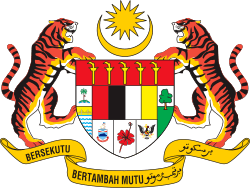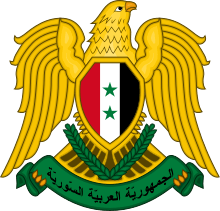Malaysia–Syria relations
 | |
Malaysia |
Syria |
|---|---|
| Diplomatic Mission | |
| None | Syrian Embassy, Kuala Lumpur |
| Envoy | |
| None |
Ambassador Vacant Chargé d'affaires a.i. Tamim Madani |
Malaysia–Syria relations (Malay: Hubungan Malaysia–Syria; Jawi: هوبوڠن مليسيا–شريا; Arabic: العلاقات الماليزية السورية alealaqat almaliziat alsuwria) are foreign relations between Malaysia and Syria.
History
The Federation of Malaya[1] and Syria established diplomatic relations in 1958. Syria established their embassy at Kuala Lumpur in 2001, while the Malaysian embassy in Damascus was established in 2002. President Bashar al-Assad visited Malaysia in 2003, with the Yang di-Pertuan Agong Tuanku Syed Sirajuddin visiting Syria in the same year.[2][3][4][5]
In 2005, Syria's relations with the west weakened after it suffered a series of economic and political sanctions, such as the US recalling their ambassador from Damascus. This saw Syria respond with an increased focus on developing ties both with their existing allies Iran and Russia, and with eastern nations, especially China, India and Malaysia. As a fellow nation where most of the population is Muslim, Malaysia has been a particular beneficiary of these efforts. Some Syrian elites have begun sending their children to learn English in Malaysia, rather than traditional destinations in the west.[3][4][5] While relations between Syria and the West partially improved from about 2006, and especially after President Obama took office in 2009, Syria has continued to further develop ties with Malaysia. Efforts to increase trade between the two countries included a 2007 visit to Syria by Malaysian Prime Minister Abdullah Badawi, and the signing of several agreements in 2009 relating to air travel and the SME sector. The Syrian-Malaysian Business Council was established in February 2011 to help further develop trade between the two countries, just one month before the Syrian Civil War started.[5][6]
Syrian refugees in Malaysia
In October 2015, Malaysian Prime Minister Najib Razak announced that at least 3,000 Syrian refugees would be resettled in the country, with Malaysia become one of the first Muslim-majority country to make this offer. Najib stated that Muslim countries were partly responsible for ensuring the well-being of the marginalised Syrians fleeing their country in massive numbers, causing social and economic stresses in Europe, during the migrant crisis.[7] The first batch of refugees arrived at Kuala Lumpur International Airport on 11 December 2015 on a flight arriving from Istanbul, Turkey.[8] The second batch of 68 Syrian refugees arrived at the Subang Air Force Base (outside of Kuala Lumpur) from Beirut, Lebanon on May 2016.[9][10]
References
- ↑ Malaysia did not come into existence until 1963.
- ↑ "Official Website of Embassy of Malaysia, Damascus". Malaysian embassy in Syria. Retrieved 21 January 2012.
- 1 2 "Malaysia-Syria Relations Continue to Grow". Asia Africa Intelligence Wire. AccessMyLibrary. 22 January 2010. Retrieved 22 January 2012.
- 1 2 Mona Yacoubian and Scott B. Lasensky (2008). "1". Dealing with Damascus. Council on Foreign Relations Press. ISBN 0-87609-408-6.
- 1 2 3 Sami Moubayed (22 January 2010). "Syria turns its attention east". Asia Times Online. Retrieved 21 January 2012.
- ↑ "Syria, Malaysia Launch Business Council". Global Arab Network. 2 February 2011. Retrieved 22 January 2012.
- ↑ "Malaysia to accept 3,000 Syrian refugees: PM Najib". Channel NewsAsia. 1 October 2015. Retrieved 2 March 2017.
- ↑ "Malaysia accepts first of 3,000 Syrian migrants". BBC News. 9 December 2015. Retrieved 2 March 2017.
- ↑ "Malaysia accepts 68 out of pledged 3,000 Syrian refugees". Al Araby (The New Arab). 28 May 2016. Retrieved 2 March 2017.
- ↑ "Malaysia accepts 68 Syrian refugees". Agence France-Presse. The Daily Star. 28 May 2016. Retrieved 2 March 2017.

